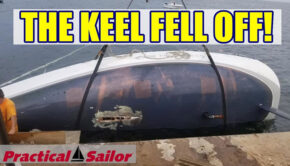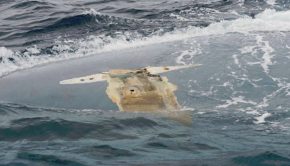Could it be the eleventh hour for the Cheeki Rafiki crew?
Published on May 22nd, 2014
BBC news reported that if by Friday at midnight EST there are no further developments to indicate search efforts would locate the crew alive, the US Coast Guard has announced they will suspend their second search for the four crewmembers of the yacht Cheeki Rafiki.
Captain Anthony Popiel said he had spoken to the yachtsmen’s families to tell them that the search could be suspended. “I informed [the families] that the search would continue throughout the night and into tomorrow.” He also said he had “sincere compassion” for the families of the four men, and that his “thoughts and prayers” were with them.
Planes and ships from the US, Canada, and Britain have continued to search for four British sailors who missing in the Atlantic on Friday approximately 1,000 miles east of Cape Cod, Massachusetts in a very remote region of the Atlantic. Search teams have covered approximately 17,500 square miles of ocean.
The Southampton-based crewmembers on board the yacht Cheeki Rafiki went missing as they were returning to Britain from a sailing event in Antigua in the Caribbean and reported that the vessel was taking on water, forcing them to change course for the Azores.
The US Coast Guard, supported by US and Canadian air forces, had mounted a search, but called it off after two days due to treacherous conditions, saying there was little chance of survival in the atrocious weather conditions. The Telegraph reported that US authorities resumed the hunt on Tuesday after a public appeal backed by UK politicians and British billionaire Richard Branson not to give up on finding the yachtsmen just yet. Mr Popeil said the decision to resume the search was made “at the request of the British government” and that he had been in regular contact with the families of the missing men.
Evoking the spirit of the 1940 evacuation of Dunkirk by a fleet of ‘little ships’, about 40 private yachts have headed to the area where the stricken boat is thought to have drifted since it capsized on Friday. The boats joining the search include a group of eight yachts and a further 32 vessels from Antigua, many of which have been competing in regattas across the Caribbean. The skippers of a further 35 yachts taking part in a rally organized by the World Cruising Club have also been asked for help. In a statement issued by the Coast Guard today, Anthony Popiel wanted to, “reiterate to all private mariners the inherent risks of operating in that environment.”
The fate of the four – named as captain Andrew Bridge, 21, Steve Warren, 52, Paul Goslin, 56, and James Male, 23 – has dominated television and newspaper headlines in Britain with their relatives publicly appealing for more time to be devoted to the search.
Mr. Popiel has said the estimated survival time after a distress alert in extreme conditions at sea was about 20 hours. He said that at about noon last Saturday, crew from the cargo ship MV Maersk Kure had located an overturned hull that matched the description of the Cheeki Rafiki but could not find any sign of the sailors.
According to Rory McKeown of UK’s Daily Echo, Matthew Sheahan, who was forced to abandon ship during the 1979 Fastnet race, said there have been examples of people surviving after more than 100 days on a life raft. Matthew, who is now racing and technical editor of Yachting World magazine, said “survival depends on so many factors. It depends on your physical state, whether you are hypothermic or suffered an injury, and it depends on the weather as well.
If we are talking about known extremes, in the early 1970s the best known cases of sea survival was the Robertson family, who survived for 37 days after their boat was hit by a whale in the Pacific. But the most extraordinary case was in 1972 when Maurice and Maralyn Bailey survived for 117 days in a life raft. Their situation was very different because it was relatively benign conditions, but never the less it is an extreme example of what can happen. It is possible to survive for a very long period of time.”
Keith Hopkins, senior lecturer in maritime and offshore safety at Warsash Maritime Academy, said one of the most important considerations for the sailors would be rations. He said, “The raft is likely to have contained some rations, and hopefully they would have had the opportunity to take more onto the raft. They would be ensuring they were eking out those rations to the maximum. The Atlantic at this time of year will still be quite cold – 15C (59F) – and then you have to consider the air chill. Hopefully they were also able to take more clothing on the raft. In terms of the conditions, it’s not just the waves that are the issue, there’s also the swell, the underlying ocean movement. But the rafts offer good protection, it’s surprising how warm they can be, but a lot of it is going to be down to the base layers of clothing they have on. It is several days now, but there’s no reason to be pessimistic and we should remain optimistic.”
Mike Crocott, professor in anaesthesia and critical care at the University of Southampton, added “It’s plausible you can survive for a long period of time assuming the weather is not hostile. They need to try and keep themselves warm and keep themselves dry.”
Relatives of all four sailors went to the Foreign Office today to be updated on the search. Gloria Hamlet, Mr Warren’s partner, said “If there’s eyes out there looking for them then there’s a chance. Hopefully today will be the day but we’ve got to wait and see. At the end of the day we’re trying to be very grounded and trying to be very realistic, but you can’t help but hope.”
sources:
UK Daily Mail, UK Daily Echo, The Telegraph, Reuters, BBC









 We’ll keep your information safe.
We’ll keep your information safe.